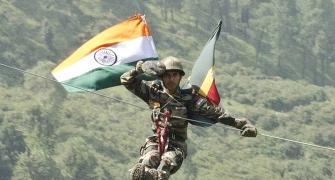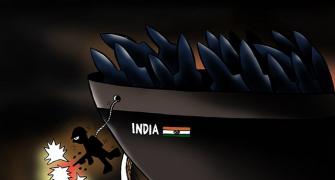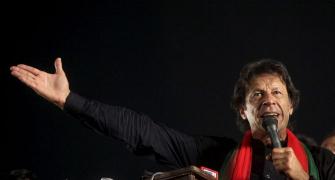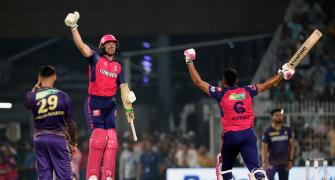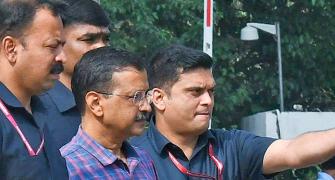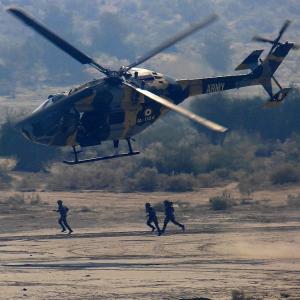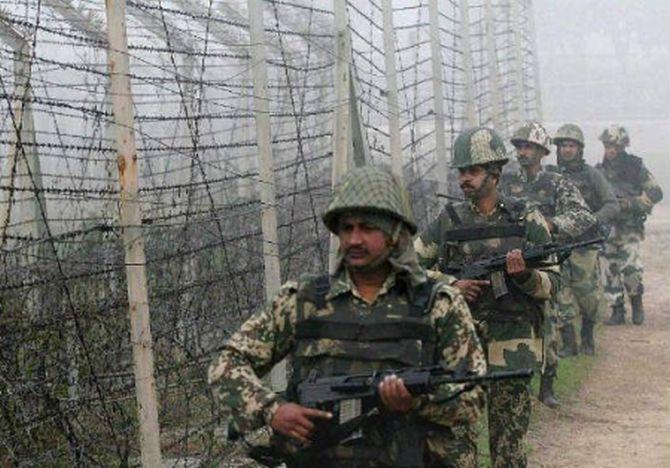'The surgical strikes were not meant to deter or stop infiltration.'
'It was meant to create a kind of uncertainty in the minds of Pakistani military commanders.'
'By using hard power we've created an option which was not there earlier.'
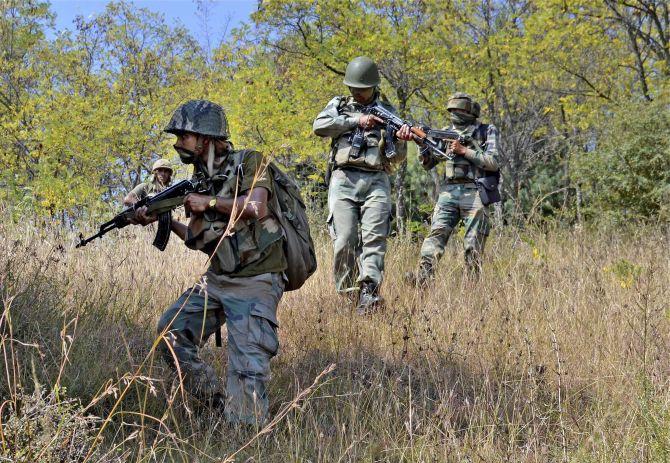
On September 29, the first anniversary of the cross-LoC surgical strikes, Nitin A Gokhale -- senior journalist, author and co-founder of Bharatshakti.in -- released his book Securing India The Modi way - Pathankot, Surgical Strikes and More.
In the book, Gokhale -- a long standing contributor to Rediff.com -- provides details of events and decisions that led to the surgical strikes and also accounts of soldiers who took part in the operation conducted on September 29, 2016.
The book also lists other policy decisions taken by the Narendra D Modi government to enhance national security.
Nitin A Gokhale spoke to Rediff.com's Utkarsh Mishra about his book and national security issues. The first of a two-part interview:
While introducing your book, you write 'This is by no means an analytical document'. Why didn't you want it to be one?
In my view, the analysis of any event should wait for sometime. Its impact should be analysed only after a certain period of time.
For example, the Dolam (Doklam) standoff was resolved while I was writing about it in the book. So I couldn't have offered an analysis on it.
The facts of any event are not fully clear in the immediate aftermath. They take time to emerge, to consolidate.
Therefore, I said it is not exactly an analysis. I may expand it into one later.
But at that moment, as they say about newspapers, I wanted it to be the first draft of history, or the first draft of contemporary events and developments.
And since I had the access, I thought it best to record it then and there, instead of waiting for 15 or 20 years.
You've pointed it out multiple times in the book that the surgical strikes of September 2016 were an unprecedented operation.
But former army chief General Bikram Singh had said there were strikes of similar nature in the past too.
How was it different?
I've explained in the book why the surgical strikes were unprecedented. I've already stated the reasons.
General Bikram Singh should know better why he made that statement. But these strikes were indeed unprecedented, for two reasons.
One, the forces never had such clear political directive from the top.
For the first time a prime minister was ready to do something like this.
It was a political gamble for him. Anything could have gone wrong.
Two, on this scale it never happened. You must have heard Lieutenant General D S Hooda, who led the operation, multiple times remarking that it was completely different from what would have happened in the past.
In the past it was just one post against the other or one battalion against another. But here you had an arc of nearly 270 km, seven locations to target at different times. There was a risk of timings going wrong.
The political willingness shown to go beyond the set template of doing 'kadi ninda' or sending dossiers was also unprecedented.
If you ask me, can they do it again? Well, maybe, maybe not. They can do something else.
But it unshackled the minds of the military commanders. They now know that if necessary, the government will authorise punitive strikes against Pakistan.
That's the difference.
Army chief General Bipin Rawat has of late said a couple of times that we can launch similar strikes again.
Either they can strike again in the similar manner, from a different location. Or they can do it some other way.
I don't know all the options that are available. It is best left to the professionals who know what they are talking about.
The army said in April that terror launch pads destroyed in surgical strikes are active again.
Can it then be said that the only purpose such strikes serve is to eliminate a certain number of terrorists at a given time?
Or do they count for some long-term gains?
I'm saying the surgical strikes were not meant to deter or stop infiltration. It was meant to create a kind of uncertainty in the minds of the Pakistani military commanders.
I don't know why people are saying (that infiltration should stop after surgical strikes). Infiltration will continue because foot soldiers are available in plenty in Pakistan.
They will continue to come and they will continue to try and stir up trouble in Jammu and Kashmir.
But by using hard power we've now created the space of an option which was not there earlier. For a short while it has served its purpose.
And as for the long-term we'll see whether it served its purpose or not.
I don't know why people have a problem in accepting the fact that these were unprecedented strikes. I think we've to overcome that bias.
Also, nobody went there with the notion that some particular results will be achieved.
The immediate thing was to send a message to the Pakistani army and the terrorists, which was done.
You also write about the NIA crackdown on Kashmiri separatist leaders, after which we saw a dramatic reduction in incidents of stone-pelting.
While it was known that these people are funded by non-State actors across the border, why didn't such action come earlier?
That's exactly what I have mentioned in the book. This government has taken initiatives in domains which were not easy to do.
Earlier governments didn't do it because there was a kind of nexus and nobody was willing to take hard decisions.
That is what shows this government in a different light that they're willing to take hard decisions.
If it comes to cracking down on the Hurriyat, why should we hesitate? That is what the difference is.
Though it has not come too soon, it takes time to build a case so that they don't get away. I think it's a very welcome step.
In the light of India's hard stand against Pakistan at the United Nations, do you think the words need to be backed up by action?
Should India revise the MFN (most forward nation) status to Pakistan or impose an embargo on trade?
These are things which need a lot of consideration. There are international treaties to be abided by. But the hard line against Pakistan that there will be no talks until terrorism stops is itself a kind of comprehensive policy.
It would have been easy for the government to succumb to the post-Burhan Wani killing hysteria and stone-pelting and say 'No, no we will start talking to both Hurriyat and Pakistan'. But they didn't do it.
They stuck to their policy and this year the results are very evident. More than 160-odd terrorists have been killed in the valley and stone pelting has almost vanished from the streets.
The government just stuck to its line that it will not talk to Pakistan under pressure. Other things will follow.
For example just a thought that India will revisit the Indus Water Treaty had Pakistan in knots. Those things will continue. We'll put Pakistan under pressure and on the back foot.
About the efforts of the PM in reaching out to countries in the Middle East, you write that it has 'rendered Pakistan impotent'. But the Organisation of Islamic Cooperation has always backed Pakistan on Kashmir. How do you see it?
The OIC can keep backing Pakistan, but what does it mean in real terms? Do they go and help Pakistan economically? Do they invest in Pakistan? Do they take a pro-Pakistan stand at the UN?
It is just a pro forma statement issued by OIC every time.
By reaching out to Pakistan's friends in the Gulf, India has actually isolated Pakistan internationally.
Often people think that isolation means they have to be completely cut off from any kind of aid or oil supply, but what it actually means that when it comes to 'India or Pakistan' at the international forums, what do these countries do?
They've also realised that they've a better chance of investing in India and make money.
No such situation exists in Pakistan. Therefore they have largely remained neutral.
You see, even after the surgical strikes, no country questioned India's newfound approach on the Line of Control.
If not for India's outreach to these countries, you would have found the OIC objecting or Russia or China saying something. That's how it makes a difference.
In diplomacy, nothing is black and white, there are always shades of grey.

